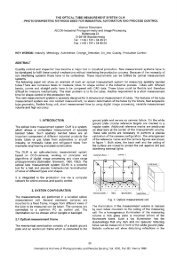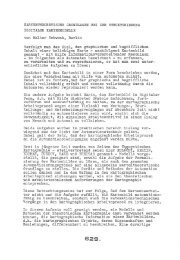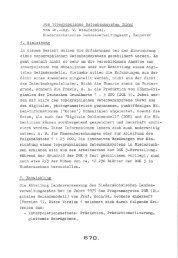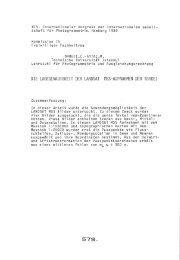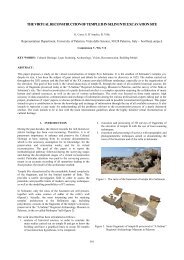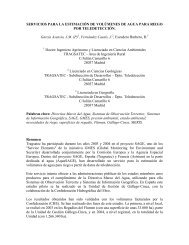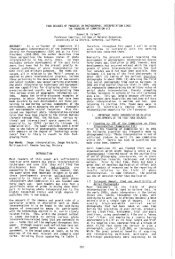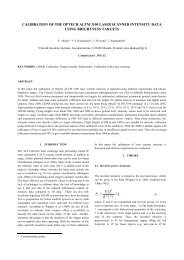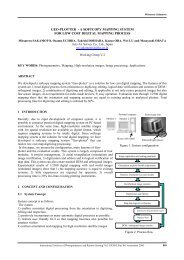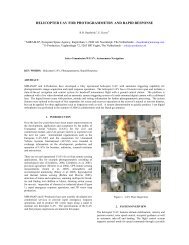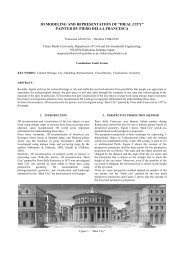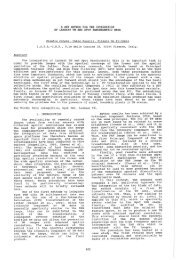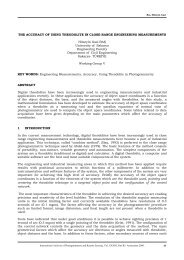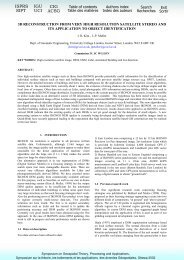Geoinformation for Disaster and Risk Management - ISPRS
Geoinformation for Disaster and Risk Management - ISPRS
Geoinformation for Disaster and Risk Management - ISPRS
You also want an ePaper? Increase the reach of your titles
YUMPU automatically turns print PDFs into web optimized ePapers that Google loves.
Activities of GSDI Association in support of global disaster management initiatives<br />
118<br />
Emergency Response <strong>and</strong> Recovery Readiness<br />
Even in large wealthy nations, local communities are<br />
told that they should not expect substantial direct<br />
delivery of goods <strong>and</strong> services from national or<br />
international relief agencies <strong>for</strong> at least 72 hours<br />
after a major widespread disaster. Thus local<br />
communities must be prepared to rely on their own<br />
public <strong>and</strong> private emergency response <strong>and</strong><br />
management systems in that most critical of time<br />
periods immediately after a disaster occurs.<br />
If the components of a spatial data infrastructure are<br />
in place <strong>and</strong> are in use on a daily basis by local users<br />
<strong>for</strong> accomplishing mapping, vehicle routing, asset<br />
management, service delivery <strong>and</strong> similar tasks, then<br />
the in<strong>for</strong>mation infrastructure is much more likely to<br />
be available <strong>and</strong> useful <strong>for</strong> accomplishing similar<br />
tasks during a calamity. Learning how to use<br />
geospatial <strong>and</strong> affiliated communication<br />
technologies doesn’t occur overnight. Nor will data<br />
needed to respond to emergencies appear out of thin<br />
air. For these reasons, the GSDI Association<br />
encourages the building of long-term SDI from local<br />
to global scales within <strong>and</strong> among all nations of the<br />
world.<br />
GSDI Conferences<br />
One of the principal activities of the association is to<br />
provide a GSDI Conference <strong>for</strong> SDI-related<br />
professionals, scientists, <strong>and</strong> applications, on a<br />
regular basis to share <strong>and</strong> exchange ideas. Since<br />
1996, experts in SDI <strong>and</strong> spatial data management<br />
matters have come together to share their<br />
experiences in advancing SDI plat<strong>for</strong>ms from local to<br />
international levels. A continuing theme of GSDI is<br />
realizing spatially enabled societies. The pressing<br />
needs of societies are a particular emphasis of GSDI<br />
conferences <strong>and</strong> include a focus on disaster<br />
prevention, warning, management, response, <strong>and</strong><br />
recovery.<br />
Small Grants Program<br />
Nations with the few economic resources are the<br />
hardest hit in the event of a natural or human made<br />
disaster. Many more lives may be lost <strong>and</strong> recovery<br />
will typically take much longer. The GSDI Association<br />
supports an annual small grants program to support<br />
national or sub-national activities that foster<br />
partnerships, develop in-country technical capacity,<br />
improve data compatibility <strong>and</strong> access, <strong>and</strong> increase<br />
political support <strong>for</strong> spatial data infrastructure <strong>and</strong><br />
earth observations application development. Priority<br />
is given to projects in developing nations <strong>and</strong><br />
countries with economies in transition.<br />
Developing Partnerships<br />
<strong>and</strong> Spreading Knowledge<br />
GSDI provides a global venue <strong>for</strong> networking,<br />
communicating <strong>and</strong> learning among its members.<br />
Through the Geographic In<strong>for</strong>mation Knowledge<br />
Networks (GIK Network) GSDI enhances<br />
communications <strong>and</strong> sharing among geospatial<br />
specialists <strong>and</strong> organizations from all nations <strong>and</strong> <strong>for</strong><br />
the global geographic in<strong>for</strong>mation community at<br />
large ( http://giknetwork.org).<br />
Open Access to Data, Tools <strong>and</strong> Learning<br />
Materials<br />
The GSDI Association <strong>and</strong> its members promote<br />
open access to the greatest extent possible to spatial<br />
data as well as to educational materials in how to use<br />
geospatial technologies <strong>and</strong> establish SDI. If those<br />
affected by a disaster can’t gain access to the detailed<br />
geospatial data <strong>and</strong> technologies they need when<br />
they need it, the data <strong>and</strong> technologies have no value<br />
<strong>and</strong> might as well not exist. In order to support<br />
learning, all past books developed by the GSDI<br />
Association have been published using open access<br />
licenses, the articles in all the proceedings from the<br />
past world conferences are openly published on the<br />
web <strong>and</strong> its web pages are all posted using creative<br />
commons licenses. Thus, legal <strong>and</strong> economic barriers<br />
to sharing among those interested in pursuing<br />
knowledge on topics such as emergency response<br />
<strong>and</strong> recovery are reduced greatly.



